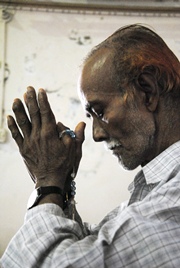|
The Prayer of Anguish ACN Reflections “Queen Esther, seized with mortal anguish, had recourse to the Lord.” Have you ever prayed like that? At some point in our lives we have probably had this kind of anguished moment, or we probably will. It comes when we have lost someone or something precious to us or are about to. The prospect of something dreadful and unbearable seizes us and we are brought to our knees in prayer. Why does God let things reach a “crisis” moment before He gets involved? Several times the Lord put a scare into His apostles. Jesus allows their boat to begin to sink or to be so violently battered by the waves that it seemed like they would go under. They even asked, “Do you not care” that this is happening to us? The very thing that the Apostles most relied upon, the place where their professional skills were best showcased, maybe the place where they felt most secure, most like men, it’s that thing that the Lord allows to totter. Or when the
Lord enabled Simon and his men to catch such an enormous quantity of fish that
their boat began to sink. Think of it: The
Lord provided just that many fish on purpose, an exact count—almost enough to sink the very boats
they were fishing from. There is a lot of meaning hidden in that fact. Even more important than anguished prayer is where it leads us. And Esther shows us the place where we should end up: “I have no one but you…I am alone and have no one but you.” Isn’t that what God wants all prayer to lead us to—to total, childlike dependence on Him? Prayer isn’t so much about requesting and receiving. It is really about this relationship, this dependence on God. Esther begins her prayer invoking God’s relationship to her fathers: Abraham, Isaac, and Jacob—all of whom found out through the most severe trials that God would not allow them to count on their own strength and understanding. Moses was an
old man, almost universally resented and even hated by his own people—but being
old, unpopular, and a poor speaker didn’t stop the Lord from choosing him to
lead His people to freedom. Moses protested, was cursed at by his own, and got
cornered on the banks of the Red Sea—and there, when all eyes were on him,
standing before the dreadful prospect of capture, God makes a dry path through
the sea. There and then, mourning turned into gladness, sorrows into wholeness—and
all in God’s time. This helps us understand why some of our prayers are not answered right away or in ways that we want. Christ will not allow us to compromise our relationship with Him for anything. He will continue to permit us to struggle and to fail until we surrender everything to Him--and even then, He may continue to permit whatever will keep us close to Him. Our troubles, even our sins, might be the unlikely bond that joins sinner to Savior. Most of the healings our Lord performs in the gospels come to people who have been suffering for a long time: eighteen years bent over, forty years blind, twelve years with a hemorrhage. How old are you right now, and what do the statistics say about your success and failure rates? Still recovering? Still healing? Still repenting? Does it sound familiar: twelve years, eighteen years, forty years or more with the same problems? Can you hear God speaking to you in all of the circumstances that cause you anguish or regret or frustration? What is His message to you in all of the things that He has chosen or at least permitted in your life? It is a sign of spiritual maturity, a sign of humility, when we reach a point where we can thank God for all of the personal struggles we have. We aren’t thanking God for evil as such, or sin as such, but just the issues we have that are our constant companions. They might make us feel less than or limited or that our freedom is restricted—but is that such a bad thing? Maybe you wish that you had better health—can you bring yourself to thank God for your health as it is? Maybe you wish that you that you were smarter, or had better skills and talents—can you thank God for the talents that He has given you? Maybe instead of becoming sad because of who we are, we can say: Lord, where would I be right now if you had given me everything I ever thought I wanted? Lord where would I be without all of my personal struggles? All of those things about which I say, I wish I didn’t have this or that problem—Can I say, Lord, where would I be without it? Our afflictions are meant to serve a higher purpose: every time we fail, every time we face sorrow, the outstretched hand and strong arm of God meet us. That was where Abraham, Isaac, Jacob, Moses, Esther, St Paul and so many others met the Lord. It was there in anguish that they learned how to say Lord. It was when they could say “I have no one but you…I am alone and have no one but you,” that they were most closely united to their Savior. |
|
|

